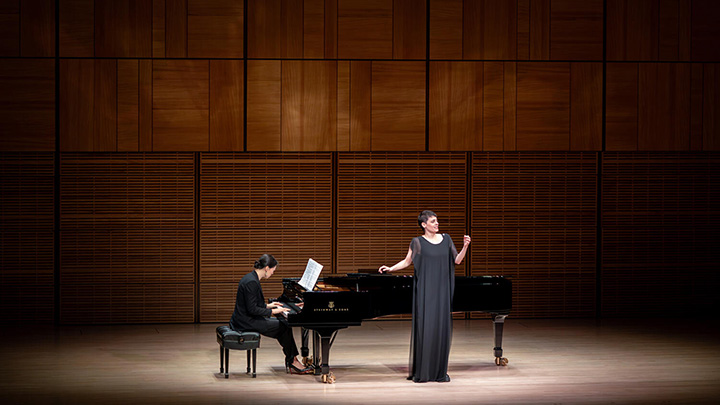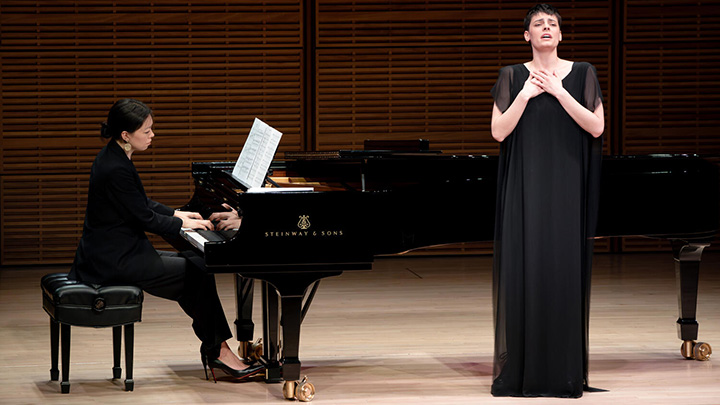On April 20, Italian-Canadian mezzo-soprano Emily D’Angelo joined accompanist Sophia Muñoz in the subterranean Zankel Hall for a recital program that probed the line between town and country.
Though not yet 30 years-old, D’Angelo has proven herself to be among the most distinctive vocalists to emerge in recent years, displaying equal amounts of daring and finesse in her interpretations of Classical and Baroque repertoire staples as she does in the contemporary selections of her superb debut album, energeia. The former Lindemann Young Artist will headline the Metropolitan Opera’s 2024-2025 season opener, the New York Premiere of Jeanine Tesori’s Grounded, only six years after making her company debut as The Second Lady in The Magic Flute. The mezzo-soprano made her entrance into Zankel in what my companion described as something out of the “chicest lesbian bar in Berlin:” a diaphanous black tunic paired with leather combat boots. Her star is indeed on the rise, but squarely on her terms.
The recital consisted of two distinct phases. The first opened with settings of Hungarian folk songs by Béla Bartók and Zoltán Kodály (sung in English translation, alas) and then winded its way through two pieces by Jeanine Tesori and finally into traditional and art songs with roots in the British Isles. The second half settled firmly into the Cosmopolitan environs of Vienna with the songs of Gustav Mahler, Alma Mahler, Erich Korngold, Viktor Ullmann, and Alexander Zemlinsky. As D’Angelo explained in the program notes, the forerunners of early twentieth-century modernism were deeply connected to the folk and oral traditions of their respective nations, and folk idioms shaped and wove their way into their works. At a moment of intense global political and cultural upheaval, these artists often turned their gaze towards the countryside to find a way forward.
The first half proved a beguiling blend of musical idioms, as D’Angelo and Muñoz wove a unified soundscape from these disparate folk traditions and rural musings. D’Angelo’s lush, claret-toned mezzo flowed out of the melancholy chords and portamenti of Bartók’s “Black Is the Earth,” before Muñoz lilted into the strange, syncopated rhythms and Phrygian shadings of “Dance of Buchum” from the composter’s Romanian Folk Dances. Kodály’s “Evening Star, which D’Angelo sang with an earnest simplicity, gave over to the roiling arpeggios of “Night Drive/The Desert” from Grounded, in which the heroine imagines viewing herself from the drone she operates. The image of her, a speck amidst the vastness of a gray desert, dissolved into a series of quiet parallel chords evoking an empty road at dusk. D’Angelo then managed a very easeful transition into the bluesy “Moon Change” from Tesori’s Caroline, or Change, evening out her sound into a stilling final diminuendo as she pondered the inevitability of change both fast and slow. Her delivery of Francis McPeake’sarrangement of “Wild Mountain Thyme,” spooled out of that stillness in waves of aching tenderness.
Throughout the evening, and especially in this first phase, D’Angelo and Muñoz demonstrated a careful control over timing, sometimes moving between pieces without pausing, other times letting the audience linger in well-placed moments of silence, as was the case in the transition between Walter MacNutt’s arrangement of “Take me to a green isle” and “The Cloths of Heaven” by Rebecca Clarke. The effect proved involving, suspending the audience’s expectations around the pacing of such a program in such a way as to keep our attention rapt. (Though the fact that the program listings were out of order in several spots may have also contributed to the general air of suspense.)
During the two selections by Clarke, a virtuoso violist and composer whom the mezzo has featured prominently in her recitals, D’Angelo balanced the inherent richness of her sound with a yielding delicacy that entwined with Muñoz’s lacelike playing. In “Of that so sweet imprisonment,” she infused a mature sweetness into the pulsating, erotic strains of Samuel Barber’s setting of a poem by James Joyce. The sudden shift into the jaunty “The Brewer” by Ralph Vaughn Williams returned us to the realm of folksong, though D’Angelo seemed more preoccupied with getting its tongue-twister of text across without stuttering than conveying its witticisms.
Our entrance into the cosmopolitan portion of the program came courtesy of “Starke Einbildungskraft,” a teasing ditty depicting two young lovers adapted from a German folksong by Gustav Mahler, which D’Angelo delivered with a coy, knowing grin. The Fünf Lieder of Alma Mahler allowed her to explore the full resonance of her sound, as each of the earlier pieces had required her to adopt some degree of straight tone or softness. Her voice easily scaled vocal lines’ arduous leaps and cut through the accompaniment’s dense, quasi-Wagnerian chromaticism. In “Die stille Stadt,” her plangent chest voice emanated a spectrum of dark blues before resolving into a shimmering haze as she sang of a traveler coming upon a light the valley and a child’s songs of praise. “Bei dir ist es traut,” taken from a poem by Rainer Maria Rilke, was the most deeply felt of these songs, as she brought out the warmth of her upper register and let the melody float across lower dynamics to convey the intimacy of the text.
While Korngold’s “Liebesbriefchen” and Ullmann’s “Wenn je ein Schönes mir zu bilden gluckte” were both opportunities to revel in some late Romantic lusciousness (and some impeccable top notes), the four songs of Alexander Zemlinsky that followed were the dramatic apex of the evening. Here, D’Angelo’s phrasing was completely attuned to the demands of the texts, many of which dealt with cosmic or eventide imagery, and Muñoz’s playing was perfectly aligned with her interpretive approach. Together, they fostered a spellbinding serenity at the beginning of “Turmwa?chterlied.” Gradually, D’Angelo added layers of intensity to the plainspoken-style vocal line, culminating in a potent crescendo as the titular watchman called upon God to accept the multitudes at his gates into his fold—a moment of searing passion, which she delivered with reverence. “Klagen is der Mond gekommen” and “Briefchen schrieb ich,” were equally gorgeous, and the latter, with text adapted from a Tuscan folksong, ended the program where it began: with a look back into the countryside for something simpler, more direct.
For her sole encore, D’Angelo gave a spirited, sultry account of “Carceleras” from Ruperto Chapí’s zarzuela Las hijas del Zebedeo. After a program that favored the placid and pensive, it served as a reminder of her impressive vocal dexterity.
Photos: Jennifer Taylor





